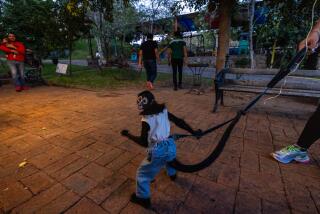‘Human Zoo’ of Exotic Women Stirs Controversy in Thailand
THA TON, Thailand — Critics called it a zoo, stocked not by animals but by 32 long-necked “giraffe women” for tourists to gawk at and photograph.
Before a recent police raid, there had been charges that the exotic tribespeople on show were being held virtual prisoners by a Thai entrepreneur who allegedly abducted them from neighboring Myanmar.
Adorning their necks with brass coils, the women of the Padaung tribe have proved a major tourist attraction since they began fleeing Myanmar, also known as Burma, more than a decade ago.
Custom prescribes that girls before puberty begin to wear coils that are augmented until they weigh as much as 11 pounds. The coils force the chin upward while pressing down the collarbones and ribs, elongating the neck.
Various origins of the custom are cited, ranging from protection against tiger attacks to symbols of wealth and status. One myth tells of a beautiful dragon with a long neck that was impregnated by the wind to produce the first Padaung people.
Most of the Padaung are in three border camps in the northwestern province of Mae Hong Son. An estimated 10,000 Thais and foreigners visit those camps each year, paying an entrance fee that allows them to photograph and mingle with the smiling, colorfully attired long-necked women and girls.
Economically it’s a virtually perfect arrangement. Everyone gets a cut--the once impoverished Padaung, Thai businessmen and government tax collectors, even a rebel group that uses the money to finance its war with the military regime in Myanmar.
While some critics have long decried the “human zoo” aspect, long-necked tourism took a darker turn last year when news reports said a Thai businessman had lured a Padaung group out of Myanmar’s Kayah state with promises of setting them up with their kin in Mae Hong Son.
It was alleged that the businessman, Dhana Nakluang, deceived the Padaung by bringing them instead to Tha Ton in Chiang Mai province, hiring guards to prevent escape and mistreating those who protested.
With Dhana facing charges, police raided the camp in February and took the women to a social welfare center.
Dhana denied he had forced them to stay at his Thanabamrungkit Farm.
“I assure you that they have a happy life here. They look healthier than when they first arrived, especially the children,” he said before the raid.
“Mae Hong Son provincial authorities are upset that I have some Padaung here in Chiang Mai. They made up the story to condemn me as they want to be the only province where Padaung exist,” he charged.
Indeed, the long-necked women have become Mae Hong Son province’s unofficial symbol, a come-on for tourists to a region where many other tribal groups now wear jeans and ride motorcycles.
In Mae Hong Son, officials, guides and others like to call the Padaung “our long-necks,” like those living at the village of Nai Soi astride the Myanmar border.
Ma Nang, a 43-year-old with 24 coils around her neck, says she is perfectly happy at Nai Soi, earning a relatively good monthly income of 3,000 baht, about $70. That involves selling handicrafts and her take from entrance fees, 250 baht ($6) for each foreigner and a cheaper “photographic fee” for Thais.
She and others interviewed said they aren’t bothered by having to strike poses when visitors point their cameras and video recorders.
“We had nothing in Burma. I had to work relentlessly in the rice fields,” said Ma Nang, who left Myanmar nine years ago. “We miss our homes, but we don’t want to go back.”
Ma Nang, whose sister-in-law died at Tha Ton, wants the Padaung there to move to Mae Hong Son.
Technically refugees, the Padaung at Mae Hong Son are better off--thanks to their elongated necks--than tens of thousands of other people who have fled Myanmar.
Nai Soi is under partial control of the Karenni National Progressive Party, one of several ethnic minority groups fighting Myanmar’s military government from bases along the Thai border.
Aung Sun Myint, a spokesman for the group, said the party needed money for its cause and to help refugees and those displaced by brutal military campaigns inside Myanmar.
“We didn’t want to get involved in this long-necked business. But the situation demands it. We have no money,” he said.
While the Padaung focus on day-to-day livelihood, outside observers argue about exploitation and distortion of tradition.
Given their tourist potential, the Padaung in Thailand no longer practice agriculture, and the men are mostly idle.
Tourism has, at least for the time being, preserved a custom that had begun to disappear as the Padaung came into contact with the outside world.
Traditionally, only Padaung girls born on a Wednesday of a full moon were destined to have their necks fitted with the coils, but now other youngsters are enlisted to meet the tourist demand.
Only initial discomfort is reported after the coils are set and as the distance from ear lobe to collarbone lengthens to as much as 10 inches, more than double the average.
The only danger posed is if the coils are removed: Suffocation can result, since the neck muscles are so weak that they cannot support the head.
More to Read
Sign up for Essential California
The most important California stories and recommendations in your inbox every morning.
You may occasionally receive promotional content from the Los Angeles Times.










